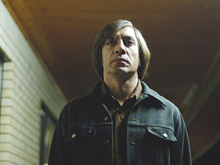 It's been a long time since No Country for Old Men passed through theaters, earned widespread acclaim, won an Academy Award, and took its place in the Cohen Brothers' filmography. Aside from some thoughts on muscular minimalism in prose and film, and maybe some musings on open narrative and thwarted expectations, I didn't have much to say about it. However, I've considered the movie some more recently while musing over philosophy in relation to film narrative, and now I think I should go back and give this film a little bit of commentary.
It's been a long time since No Country for Old Men passed through theaters, earned widespread acclaim, won an Academy Award, and took its place in the Cohen Brothers' filmography. Aside from some thoughts on muscular minimalism in prose and film, and maybe some musings on open narrative and thwarted expectations, I didn't have much to say about it. However, I've considered the movie some more recently while musing over philosophy in relation to film narrative, and now I think I should go back and give this film a little bit of commentary.The underpinning of this film was its distillation of old Western archetypes into brutal central characters who seem so rugged and iconic... so intent on survival... that watching them come to blows is an epic experience. Llewelyn was a perfect rugged hero, salvaging blood money from the scene of a crime and struggling to keep him family safe from its pursuers. Tommy Lee Jones made a compelling weathered country Sheriff, driven out of his field by the injustice he has to face. However, I think most viewers will agree that it was Javier Bardem's character, the chilling, soulless hitman Anton Chigurh, who was most inspiring in the eye of the camera. He was a ghastly presence who moved through the narrative like a silent steam engine, and though he wasn't the narrator nor the protagonist, he was probably the true central character of the film.
At the time, Anton's gimmick... asking each of his victims to bet their life on a coin toss... seemed a bit trite, a little too much like Two Face's games with a two-headed silver dollar. However, on some reflection, it occurs to me that Anton's coin tosses were framed very much in terms of choice and agency, and so they took on a more philosophical edge than Two Face's little sadisms.
It is Llewelyn's wife, Carla Ann Moss (played by Kelly MacDonald), who brings this philosophical edge to light. At the last moment, before he kills her (a promise he made to Llewelyn), Anton gives Carla the choice to bet her life on a coin toss. This is her one chance to save her own life, and in an act of suicidal defiance, she gives it up, telling Anton that she doesn't believe she's really choosing... that he is the one with the gun, and he is the one who will decide whether to shoot her. In a certain way, she is entrusting herself to Anton, rather than to fate, and we, as the audience, know this isn't a particularly good idea.
It strikes me how much this game of Anton's is like Pascal's Wager. You may or may not have heard of it... it's the rationalist Pascal's idea that we can't know whether God exists, but we know that if He DOES exist, He will reward our belief in him. Thus, Pascal says, we should bet on belief, rather than submitting to uncertainty. By refusing to believe, our only possible futures are nothingness (if there's no God), or damnation (if there is a God). By contrast, if we gamble on God's existence, our possible outcomes are nothingness (again, in the case of God's non-existence) or eternal bliss (if God does actually exist).
This is a game theory decision. As rational actors, we're expected to weigh all possible options, recognize the one with the greatest strategic advantage, and follow that path. This may seem like a very cold, calculating reason to adopt Jesus as your personal Savior, but for Pascal, the point isn't the game. The point is that we all have the option to choose, and God has given us something to gamble on. If we refuse to believe, we're resigning ourselves to uncertainty and refusing to take agency over our own beliefs. It's sort of a precursor to Kierkegaard's existentialist "leap of faith."
Anton offers his victims a similar option... Carla in particular. Confronting her in her own home, he clearly intends to kill her. However, in her hands he places at least one final option -- the option to call a coin toss, and possibly save herself. Anton is saying to her, "you can choose to play the game, and entrust your life to something you truly can't predict, if you can overcome your fears of the unknown."
By this reading, Carla remains the staunch atheist, telling Anton that he, rather than she, is the one who must choose. This is not the right answer, as the film subsequently suggests. Anton was offering her a leap of faith -- giving her a 50/50 chance to save her own life, just as we may look into the face of a 50/50 chance for eternal salvation. And by this reading, perhaps Anton, by all accounts a force of nature, was trying to give Carla the chance she needed to escape. Perhaps the final moral infraction is the denial of one's own agency, and perhaps it's Carla's sin to bear after all.

brilliant analogy
ReplyDeletePascal assumes that if God exists and we have denied him, we will be damned. The whole wager falls apart there. This poses an egotistical, vengeful god- he gets lowercased here for being a biotch. Why would I chose to be subservient to such a being?
ReplyDelete